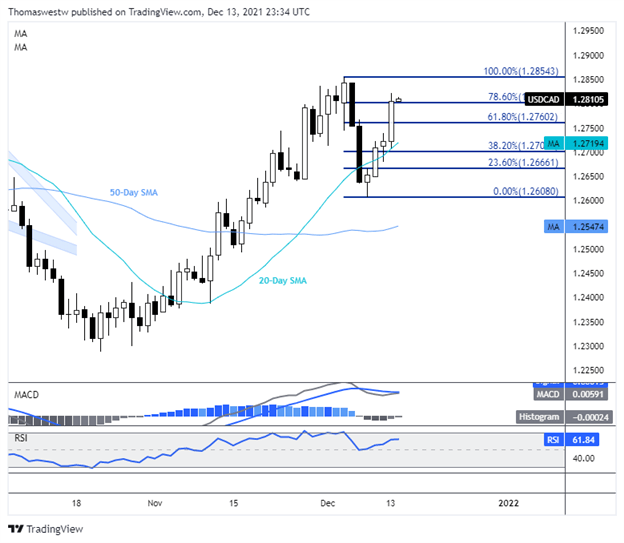USD/CAD TECHNICAL FORECAST
USD/CAD has retraced most of its post-BoC drop, with the pair crossing above the 78.6% Fibonacci retracement level. The December multi-month high at 1.2854 may serve as a point of resistance, but clearing the level likely opens the door for further strength. Alternatively, a move lower will likely take aim at the rising 20-day Simple Moving Average (SMA). Intermediate support from the Fib levels is also on the cards.
TUESDAY’S ASIA-PACIFIC FORECAST
Overnight, the Bank of Canada (BoC) agreed to extend the 2% annual inflation mandate, which was set to expire on January 1. This allows BoC policymakers more flexibility in combating rising prices while waiting for the economy to absorb labor market slack. Inflation in Canada is at a nearly 20 year high. The mandate is now in place until 2026. The Canadian Dollar failed to react to the news, but falling oil prices have weighed on the Loonie.
The risk-sensitive New Zealand Dollar fell versus the Greenback overnight after China reported its first Omicron case, and the United Kingdom saw its first death from the new strain. Prime Minister Boris Johnson said Monday that at least one person has died from the variant. China’s port city of Tianjin reported an Omicron case after the country’s Centers for Disease Control and Prevention identified Omicron in its sequencing data.
Meanwhile, cases are also on the rise in the United States, with the average daily case count well above 100,000. This has economists concerned ahead of the busy holiday travel season, at a time when cases were starting to trend lower amid rising vaccination rates. Widespread lockdowns are unlikely in the United States at the current moment, but local and state measures along with worries among the populace may drag on economic growth.
New Zealand reported food inflation data for November this morning at 4.0% on a year-over-year basis. That is up from 3.7% in October. The Reserve Bank of New Zealand began hiking ahead of other major central banks earlier this year, stoking concerns that the aggressive central bank policy may drag on growth in the island nation. The country’s third-quarter gross domestic product (GDP) growth rate will cross the wires later this week. Analysts expect Q3 growth to cross the wires at -1.6%, with the negative figure attributed largely to a series of lockdowns from the Delta strain.
Speaking of inflation, India’s inflation rate for November was reported at 4.91% y/y. That was below what analysts were looking for at 5.1% but up from October’s 4.48% reading. Later today, Australia will see a business confidence report for November from National Australia Bank (NAB). Japan is set to report industrial production data (Oct), and China will see foreign direct investment (FDI) for November. A strong FDI figure out of China may help cool some worries over the landfall of the Omicron variant.



